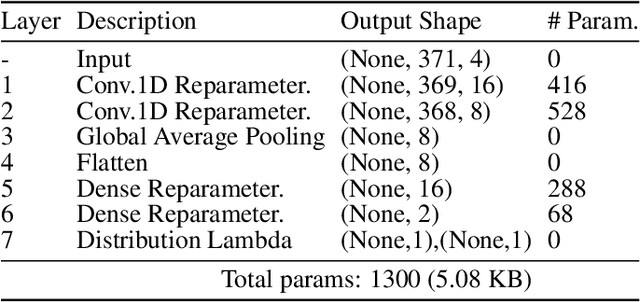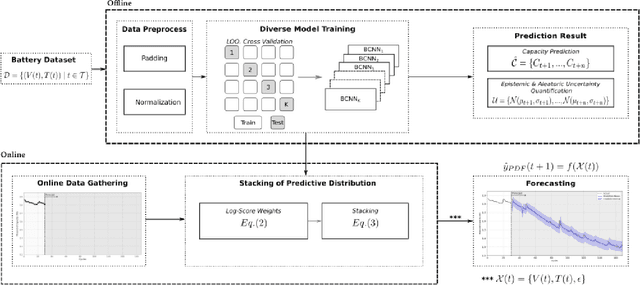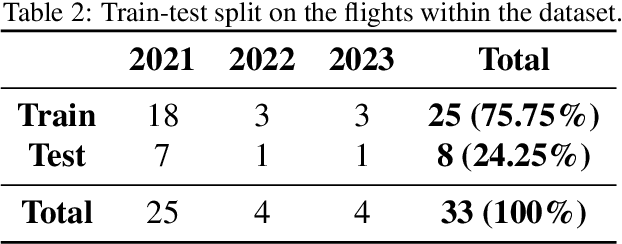Jokin Alcibar
Disentangling Aleatoric and Epistemic Uncertainty in Physics-Informed Neural Networks. Application to Insulation Material Degradation Prognostics
Jan 07, 2026Abstract:Physics-Informed Neural Networks (PINNs) provide a framework for integrating physical laws with data. However, their application to Prognostics and Health Management (PHM) remains constrained by the limited uncertainty quantification (UQ) capabilities. Most existing PINN-based prognostics approaches are deterministic or account only for epistemic uncertainty, limiting their suitability for risk-aware decision-making. This work introduces a heteroscedastic Bayesian Physics-Informed Neural Network (B-PINN) framework that jointly models epistemic and aleatoric uncertainty, yielding full predictive posteriors for spatiotemporal insulation material ageing estimation. The approach integrates Bayesian Neural Networks (BNNs) with physics-based residual enforcement and prior distributions, enabling probabilistic inference within a physics-informed learning architecture. The framework is evaluated on transformer insulation ageing application, validated with a finite-element thermal model and field measurements from a solar power plant, and benchmarked against deterministic PINNs, dropout-based PINNs (d-PINNs), and alternative B-PINN variants. Results show that the proposed B-PINN provides improved predictive accuracy and better-calibrated uncertainty estimates than competing approaches. A systematic sensitivity study further analyzes the impact of boundary-condition, initial-condition, and residual sampling strategies on accuracy, calibration, and generalization. Overall, the findings highlight the potential of Bayesian physics-informed learning to support uncertainty-aware prognostics and informed decision-making in transformer asset management.
Towards a Probabilistic Fusion Approach for Robust Battery Prognostics
May 24, 2024



Abstract:Batteries are a key enabling technology for the decarbonization of transport and energy sectors. The safe and reliable operation of batteries is crucial for battery-powered systems. In this direction, the development of accurate and robust battery state-of-health prognostics models can unlock the potential of autonomous systems for complex, remote and reliable operations. The combination of Neural Networks, Bayesian modelling concepts and ensemble learning strategies, form a valuable prognostics framework to combine uncertainty in a robust and accurate manner. Accordingly, this paper introduces a Bayesian ensemble learning approach to predict the capacity depletion of lithium-ion batteries. The approach accurately predicts the capacity fade and quantifies the uncertainty associated with battery design and degradation processes. The proposed Bayesian ensemble methodology employs a stacking technique, integrating multiple Bayesian neural networks (BNNs) as base learners, which have been trained on data diversity. The proposed method has been validated using a battery aging dataset collected by the NASA Ames Prognostics Center of Excellence. Obtained results demonstrate the improved accuracy and robustness of the proposed probabilistic fusion approach with respect to (i) a single BNN model and (ii) a classical stacking strategy based on different BNNs.
A Hybrid Probabilistic Battery Health Management Approach for Robust Inspection Drone Operations
Apr 24, 2024



Abstract:Health monitoring of remote critical infrastructure is a complex and expensive activity due to the limited infrastructure accessibility. Inspection drones are ubiquitous assets that enhance the reliability of critical infrastructures through improved accessibility. However, due to the harsh operation environment, it is crucial to monitor their health to ensure successful inspection operations. The battery is a key component that determines the overall reliability of the inspection drones and, with an appropriate health management approach, contributes to reliable and robust inspections. In this context, this paper presents a novel hybrid probabilistic approach for battery end-of-discharge (EOD) voltage prediction of Li-Po batteries. The hybridization is achieved in an error-correction configuration, which combines physics-based discharge and probabilistic error-correction models to quantify the aleatoric and epistemic uncertainty. The performance of the hybrid probabilistic methodology was empirically evaluated on a dataset comprising EOD voltage under varying load conditions. The dataset was obtained from real inspection drones operated on different flights, focused on offshore wind turbine inspections. The proposed approach has been tested with different probabilistic methods and demonstrates 14.8% improved performance in probabilistic accuracy compared to the best probabilistic method. In addition, aleatoric and epistemic uncertainties provide robust estimations to enhance the diagnosis of battery health-states.
 Add to Chrome
Add to Chrome Add to Firefox
Add to Firefox Add to Edge
Add to Edge